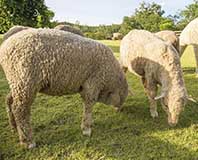Read the latest information on
Foot-and-mouth disease

Sheep owners are encouraged to complete a survey.
Sheep producers are being encouraged to help the national Sheep Health Project (SHP) address the impacts of endemic health conditions by filling out a short online survey.
Coordinated by Animal Health Australia (AHA) on behalf of sheep industry peak bodies, the SHP aims to reduce the production and financial consequences of endemic diseases and other livestock production conditions on-farm and in the sheep supply chain through abattoir monitoring and communication activities.
WoolProducers Australia Chief Executive Officer Jo Hall said that feedback from sheep producers was important to ensure the project could achieve its purpose and meet farmer expectations.
“The vision of the project is continuous improvement in industry management of sheep health and biosecurity, which sustains efficient production and ongoing market access. Hearing the thoughts of producers is an important part of us being able to reach this broader goal of better animal health outcomes for sheep,” said Ms Hall.
A number of survey questions focus on the National Sheep Health Monitoring Project (NSHMP), a key part of the SHP which monitors lines of sheep in abattoirs for health conditions that reduce farm profit through production losses or increased meat processing wastage.
“The interactions producers have had with activities under the NSHMP will determine a large part of the value of the overall SHP, so it’s important we gauge these experiences,” said Ms Hall.
The survey takes five minutes to complete and producers who fill out the survey will also go into the draw to win one of three $50 RM Williams gift vouchers.
Further information about the Sheep Health Project can be found on the Animal Health Australia website.